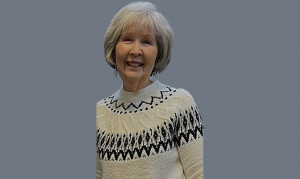Thank goodness that my parents believed — and firmly practiced — the old-fashioned philosophy of “Children should be seen and not heard.”
I spent most of my childhood being seen. But because I was expected to sit at a dinner table or on a footstool in a living room and listen, I became “Big Ears” which is what Mama sometimes called me. At the age of six, I’d rather listen to the grown-ups tell stories than to play with my Barbies.
Born late in life to my parents and plopped down in the middle of nowhere’s Rural Route One, there were rarely other kids around. The only time I had played with other children was when we visited my grandparents and my cousins were visiting, too. There wasn’t room enough in that four-room mountain shack for all of us so we young’uns scattered to the barn and played in the hayloft.
Otherwise, I was to be found seated in the midst of adults, usually rural and poor farm folks, listening to the stories they had to tell.
That is why I make my living as a storyteller. It’s how I was raised.
Back in the early days of my childhood, the country people still brought the dead back home to lay “a’corpse” in their simple little farmhouses. There is one smell that stands out from my childhood recollections: strong coffee, percolating in a tall pot that had been dragged in by a member of the Goodwill Circle, mixed with the smell of carnations that set in wreaths around the casket. It was a smell that hit the nostrils full-force as we walked in the door.
There’s no better time to hear a good story than when someone dies. Folks tell stories they wouldn’t have told when the deceased was alive. Good and bad stories.
“I wouldn’t have said this when he was alive but he was the orneriest thing. Set in his ways like nobody I ever knew. He made that stubborn mule of his look reasonable.”
Then they’d take off into stories to prove his orneriness.
In those days, funeral homes always hung a mourning wreath on the door and sometimes put a sign out that said, “Funeral. Slow.”
This was the practice until about 20 years ago when no-goods used it as a way to rob a house. They’d look up the obits, read the time of the funeral, then set about their wicked way while a family was burying its dead. I miss that because it was sometimes the way I discovered that a friend or acquaintance had died. I’d drive by and see the funeral wreath.
Our local radio stations still read the obituaries every day on the morning and noon news. One day, after Tink first moved to the South, he was driving to the airport and listening to the local radio station.
As soon as he could, he called. “Baby! You won’t believe this. I heard them reading the OBITUARIES on the air!”
What was new to him was old and familiar to me.
When I think back to those stories, I’m struck by how simple but life-worthy they were. Most had never traveled farther than an hour from their house yet they had faced down the evils of drink, the cold of brutal winters, death that came to babies, dirt that wouldn’t yield a turnip and, with great care, they tied pennies into the corners of thread bare handkerchiefs.
Today, I think about the lessons I learned from those good folks as they sat up with the dead or they shared a cup of coffee with the preacher and his family including his little girl who would see more of the world than they could ever imagine existed.
But in her deep-down heart, she knows she owes most of what she is to all of them.
And those nights of coffee and carnations.
[Ronda Rich is the best-selling author of “Let Me Tell You Something.” Visit www.rondarich.com to sign up for her free weekly newsletter.]













Leave a Comment
You must be logged in to post a comment.